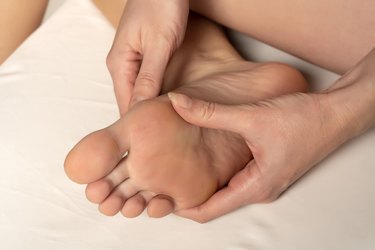
Eating too much salt can play havoc with your blood pressure, but it can also cause obvious effects, like swollen feet. If your shoes are pinching more than normal, it might be time to take a look at your diet.
Read more: Salt and Blood Pressure: What You Need to Know
Video of the Day
Video of the Day
Swelling After Eating Salt
A common type of swelling is known as edema, which occurs when there's a buildup of fluid in your body. One swelling trigger is indeed eating too much salty food, according to the U.K.'s National Health Service (NHS).
"Sodium causes swelling through the retention of water with salt when sodium is ingested," explains Len Horovitz, MD, an internist and pulmonary specialist at Lenox Hill Hospital in New York City. "This can raise vascular volume and can contribute to higher blood pressure."
Swelling can also be caused by congestive heart failure, phlebitis and lymphedema, Dr. Horovitz says.
According to the Michigan Medicine, your feet, ankles, lower legs and hands in particular can swell when the temperature is hot (heat edema) or due to the effect of gravity if you stand in one position for an extended period of time. Other potential contributing factors to localized swelling include:
- Infection.
- Burns.
- Inflammation due to repetitive motion.
- Small tears around a tendon (tendinosis).
- Repeated twisting of a joint.
- Rapid joint movements.
- Swollen glands.
- Allergic reaction.
- Autoimmune disease.
- Circulation problems stemming from certain medical conditions.
- Fluctuation of hormone levels.
In addition, others factors and conditions that may contribute, the NHS says, include:
- Pregnancy.
- Being overweight.
- Certain medications, namely contraceptives, blood pressure medications, antidepressants and steroids.
- Injuries such as sprains and strains.
- Insect bites and stings.
- Medical conditions involving the liver, heart or kidneys.
- Blood clots.
How to Prevent Swelling
One way is — you guessed it — reduce your intake of salt, both from the salt shaker and packaged and processed foods, which often include salt/sodium added both as a flavoring and as a preservative.
"Most prepared and canned foods contain a higher-than-desired salt content," Dr. Horovitz says. "Processed meats such as salami are clearly high." He points out that salt substitutes, such as potassium iodide, can substitute for salt, but don't taste quite as good.
According to Michigan Medicine, lifestyle tips that can help prevent swelling include:
- Avoid sitting with your feet hanging for extended periods of time. Instead, elevate your feet when you can.
- When traveling by car, make sure to stop and walk around at least every couple hours.
- When traveling by plane, stand up and walk around at least every couple hours.
- Exercise regularly.
- Drink plenty of fluids.
- Take measures to keep your skin cool when it's hot outside.
- Avoid excessively repetitive motions, but if unavoidable, take a break every so often to rest the body area being moved.
- Follow the instructions for any medications you're taking. If a medication seems like it might be causing swelling, ask your doctor if taking it at a different time of day might avoid this.
- Don't smoke cigarettes and other tobacco products as they can worsen circulation problems.
- If you're pregnant or have a chronic medical condition, listen to your doctor's advice on how to prevent swelling. And call your doctor if you start experiencing it.
How to Ease the Swelling
Sometimes you can develop swollen feet or hands despite your best efforts. If the swelling doesn't go away on its own, there are some things you can try to help it resolve, according to Michigan Medicine:
- Lie down and place pillows beneath the swollen area to raise it above the level of your heart.
- Get some exercise, such as walking, to improve blood flow.
- Purchase wider shoes with low heels and soft soles.
- Avoid standing for prolonged periods of time, remembering to take a break every hour.
Read more: 6 Exercises for Swollen Feet and Ankles
Is this an emergency? If you are experiencing serious medical symptoms, please see the National Library of Medicine’s list of signs you need emergency medical attention or call 911.